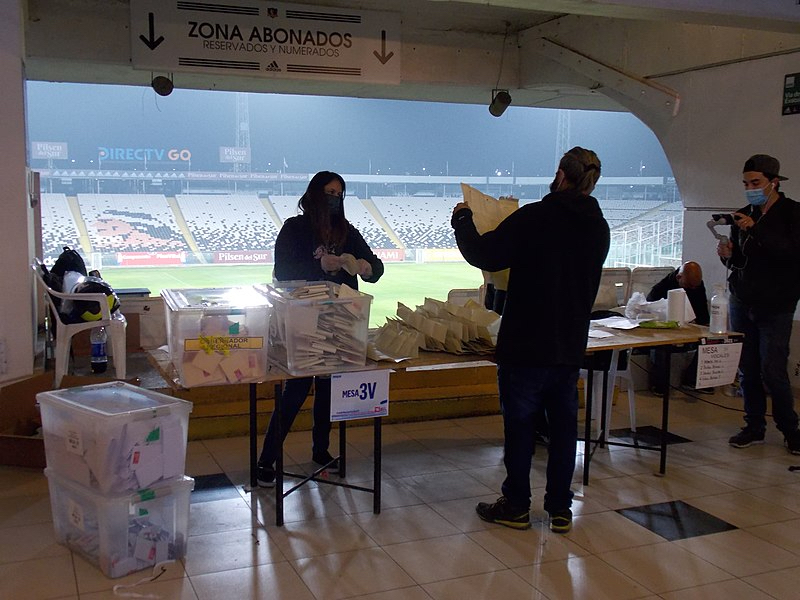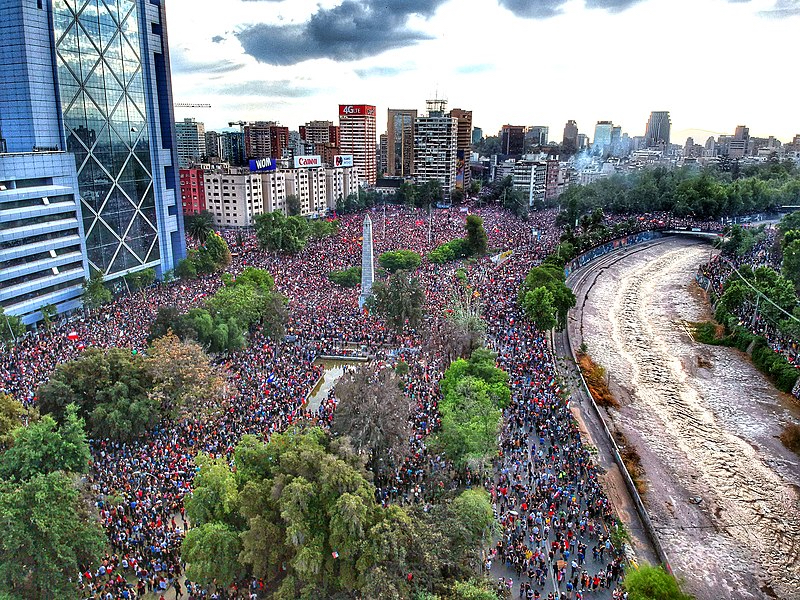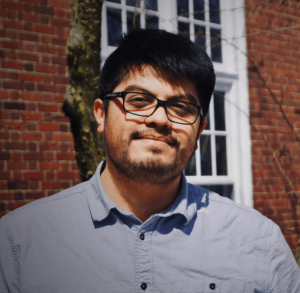
Poll workers tally votes in the election for members in the constitutional assembly in May, 2021. Photo by Simón González, used under Creative Commons License CC BY-SA 4.0
In May, Chilean citizens flocked to polling stations to participate in an election for an unprecedented four categories of office. On top of the regularly scheduled elections for mayors and city councils, citizens also elected governors for the first time since the country’s transition to democracy in 1989. Most importantly, this election in addition included a ballot to choose members for the assembly tasked to write a new constitution.
Voting for members to the constitutional assembly is the second of three steps in the process of drafting a new constitution. The first step was last October, with a referendum that asked citizens whether the country needed a new constitution to begin with, and, if so, who would be tasked with writing it. The referendum was originally scheduled for the previous April, but public health concerns related to the global pandemic forced authorities to postpone it. Despite continuing apprehensions six months later, nearly 51 percent of the voting age population participated in the referendum, making it the election with the highest turnout in the country’s history. 78 percent of those voters supported the drafting of a new constitution, and 79 percent preferred it to be written by an independent, democratically elected body. Moreover, the option against writing a new constitution won the majority vote in only five out of 346 of municipalities, with three of them corresponding to the wealthiest and most conservative neighborhoods of the Santiago metropolitan area.
Why is Chile writing a new constitution? The current charter was partially enacted during the Pinochet dictatorship in 1981, taking full effect as the country transitioned to democracy at the end of the 1980s. Although it was amended in 2005, the demand to write a completely new constitution has been a catalyst for diverse progressive movements dissatisfied with the country’s unequal development since the turn of the 21st century.
For example, post-secondary student protests in 2011 against for-profit education quickly identified in the current constitution the main blockage to enacting meaningful reforms. In the lead-up to the 2013 presidential elections, their efforts converged towards a campaign that encouraged citizens to write the initials AC (standing for Asamblea Constituyente) in the corner of their paper ballots. Since the current constitution does not allow for citizen-led ballot initiatives, this would serve as an unofficial referendum to gauge support for the drafting of a new constitution. In subsequent years, progressive movements seeking change in areas as diverse as the environment, pensions, gender equality, public transportation, minimum wage, and the recognition of indigenous peoples also identified a new constitution as part of their core demands.
But why is Chile writing a new constitution now? The current process is a response from the government and legislature to a series of massive demonstrations that started in October, 2019 and only ceased in March, 2020 due to pandemic-related concerns. While the country has experienced numerous protests since the beginning of the 21st century, what took place in 2019–20 reached unprecedented impact and scale. Protests extended for nearly half a year, reached every major city in the country, brought millions to the streets, and led to considerable damage to public and private infrastructure, which was countered with what many human rights organizations considered excessive violence from public security forces.

View of the protests for a new constitution in October, 2019 in downtown Santiago. Photo by Hugo Morales, used under Creative Commons License CC BY-SA 4.0
On the surface, the protests started with a coordinated fare-evasion campaign led by high school students in reaction to increasing public transportation fares. But at the core of the social outbreak lay a generation born around the end of the dictatorship that grew up in the political and economic system inherited from it. The system brought impressive economic growth at the cost of mounting inequality and political disaffection. This is the generation that has expressed discontent with the status quo at every step of the way. They protested for-profit education in 2005 as high schoolers and they pushed for equal access to post-secondary education in 2011. Their leaders became politicians and civil-society organization leaders, but a majority were confronted with the contradictions of the Chilean dream as they entered the workforce. Much like millennials in the United States, they learned that post-secondary education is not sufficient to secure a decent-paying job, and even less so to keep up with college loan payments and an ever-increasing cost of living. They see how the generation before them received miserable pensions, a byproduct of the privately-owned pension scheme implemented during the dictatorship. They also see the generation coming after them protesting as they did in high school, and they transformed the movement into a critique of the entire system.
How will a new constitution help? The current crisis is rooted in discontent with the country’s education and health systems, pensions, and wages. More precisely, the frustration lies with the inability of the country’s government and legislature to enact meaningful change over thirty years. This stems from the restrictive majorities required by the current constitution to make reform in these important areas. The common theme across core issues is that the current constitution identifies them as matters of “organic law,” which means that any reform in these areas requires the approval of supermajorities in both the Chamber of Deputies and the Senate. This gives conservative groups that have traditionally controlled one-third of the legislature effective power to veto any attempt at meaningful reform. At a minimum, a new constitution should establish less restrictive approval thresholds.
Many aspects of the current constitution-writing process give Chileans hope. By design, this is the first time in history that a constitutional assembly has gender parity in its membership. Moreover, 17 of its 155 seats are reserved for representatives from indigenous peoples, elected in separate ballots. On top of the widespread support in the referendum for a new constitution, most of the members elected to the constitutional assembly are independents (30 percent) or belong to non-traditional political parties (19 percent). In turn, only 24 percent of the seats belong to the conservative and right-wing parties that have traditionally prevented reform.
The third and final step in the process is an exit referendum to approve or reject the draft of the new constitution, which the assembly has nine to twelve months to prepare and present. Despite the hopes for a positive outcome, we may see two challenges in the next months. First, the second-round elections for governor had a record-low participation of less than 20 percent of the voting-age population, which means that public interest in the process can vanish quickly. Second, most members in the constitutional assembly represent diverse interests that are only connected to each other through the demand for a new constitution, so we are yet to see whether these independent forces will be capable of reaching consensus, and there is a risk of cooptation from traditional parties that have the expertise and resources to lead the bargaining process.
All this means that Chile can have a better constitution, but also one featuring widespread support from the population, which can reestablish political legitimacy in a country that has only seen it decline since its transition to democracy. Yet the remaining stages in the process are not without challenges, and those looking at the Chilean case as the potential solution for representation crises in other Latin American countries and elsewhere should look at what is to come with hope and caution in equal measure.

Gustavo Diaz received his Ph.D in Political Science from the University of Illinois at Urbana-Champaign in 2021. He studies issues of accountability and representation in the Global South, with a focus on Latin American politics.
699 total views, 1 views today